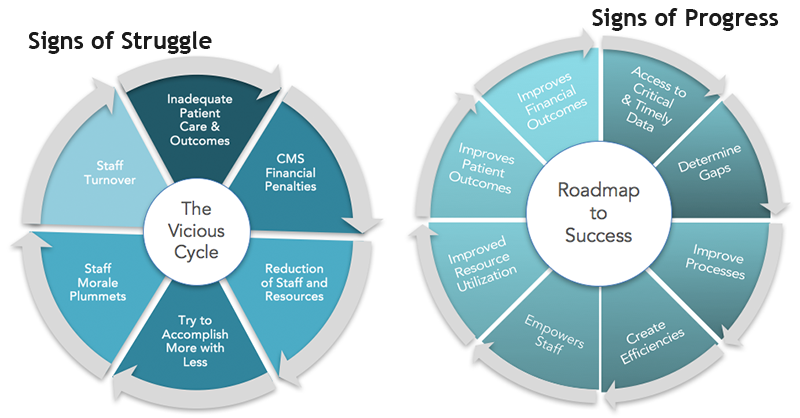Change Based on the Science of Process Improvement
The intent of our Accreditation process is to improve the care of acute coronary syndrome (ACS), heart failure (HF), and the atrial fibrillation (AF) patients. We believe this is best accomplished by using the principles found in the science of process improvement.
Process improvement is an on-going effort to identify and improve processes used by your facility. It requires an understanding of "change" and the ability to accept that change is inevitable, mistakes will occur, and whatever is done can always be done more efficiently. There will continually be new research that translates into improved methods of caring for patients, and the need to stay abreast of these changes in order to improve patient outcomes is a necessity.
Identifying and implementing Processes of Care within your hospital will help transform your organization, improve healthcare processes, quality outcomes, remove waste, and deliver the best value to the patient. It will help focus on interventions that improve quality and safety through translating evidence into practice.

Leadership and Change Management go hand in hand with Process Improvement and will change your existing culture and help your leadership focus on identifying, advancing and synthesizing hospital wide clinical pathways for successful implementation, adaptation and sustainability of process improvements in healthcare processes.
Our Team Approach helps clinicians evaluate and assess their facility's mechanisms for identifying, streamlining, and improving all of the procedures related to patient safety, clinical workflows, and delivery of CV care. This team approach encourages peers to envision and embrace a better way.
Accreditation will give your hospital the framework and guidance to bridge gaps, reduce the variances of care, accelerate the adoption of guidelines, update old protocols, identify and streamline interlinked processes, and makes changes that will result in quality improvement. The benefits to the facility that accomplishes accreditation are many. They can include streamlining patient throughput, resulting in a reduction in the time it takes for patients to receive treatment, and decreasing costs by providing efficient and effective care that is void of duplication and waste. Process Improvement allows for consistent training and education, improves patient satisfaction, decreases liability exposure and improves work performance.
American College of Cardiology's Suite of Cardiovascular Data Registries help hospitals further measure and improve the quality of care they provide. The National Cardiovascular Data Registry consists of eight hospital-based registries and two outpatient registries.
The often repeated adage, "If you cannot measure it, you cannot improve it" applies. The ACC registries offer the most relevant data elements and metrics, actionable reports, voluntary public reporting and other opportunities to do even more with your data through quality improvement programs. NCDR registries cover a wide range of clinical topics and cardiovascular procedures, with each registry featuring standardized, evidence-based data elements and definitions. Options for data collection vary based on your setting.
Get the Process Improvement Overview
Need to get familar with the concepts and terms of process improvement? Download our Process Improvement Overview.







